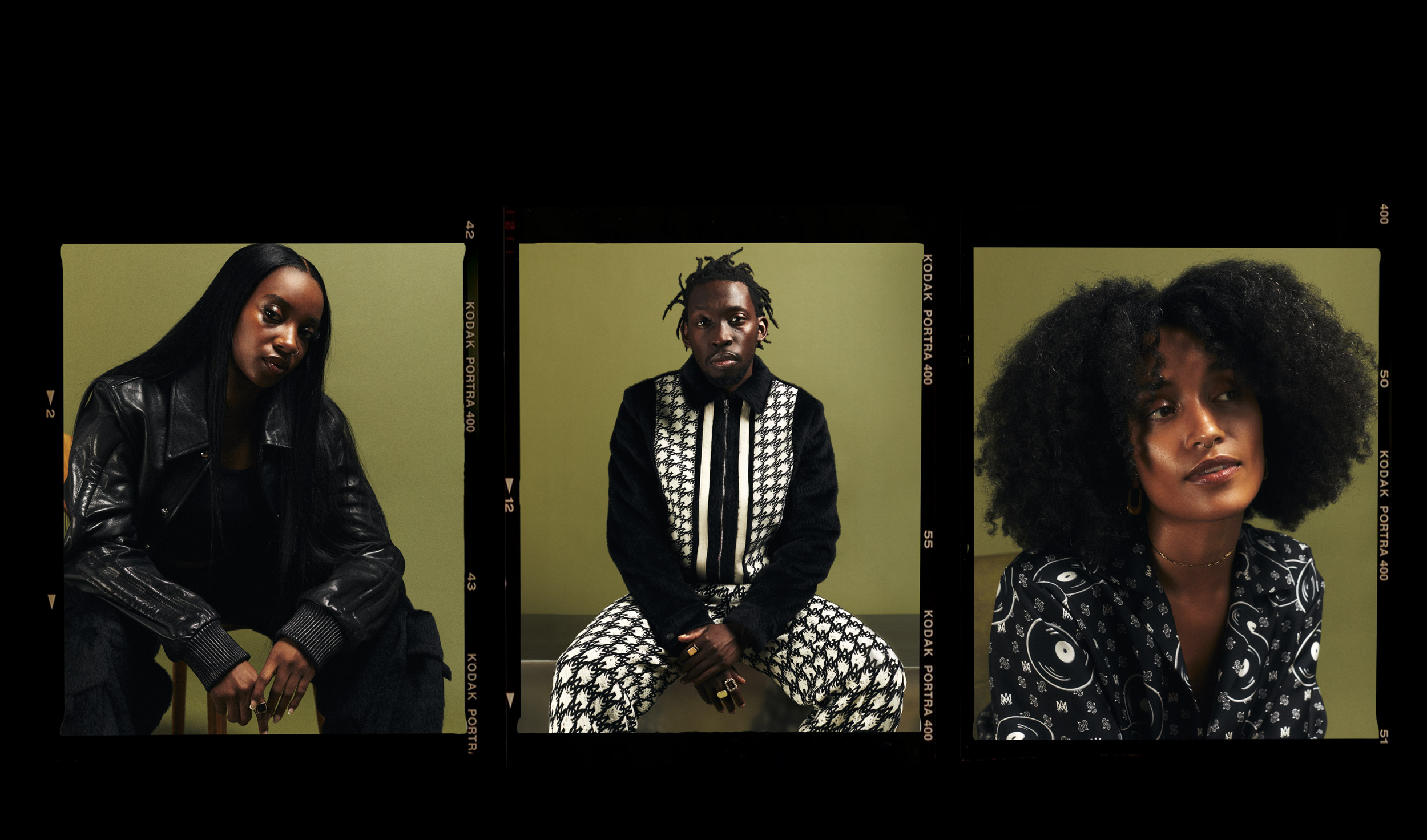
THE INTERVIEW
MAKE SOME NOISE: AMIRI
London must have something in the water. From Brockley to Bow, Lewisham to Ladbroke Grove, a new generation is discovering sounds, exchanging ideas, and forming a shared lineage that is both loose yet unified.
Little wonder LA brand AMIRI has found a home away from home there. Launching an exclusive capsule collection with an event at Browns Brook Street earlier this month, the musically-minded label is turning up the volume on London talent. To celebrate, The Face Editor Matthew Whitehouse meets musician Ojerime, DJ and broadcaster Zakia Sewell, and Touching Bass founder Errol, to see how formative memories can shape new ways of expression today.
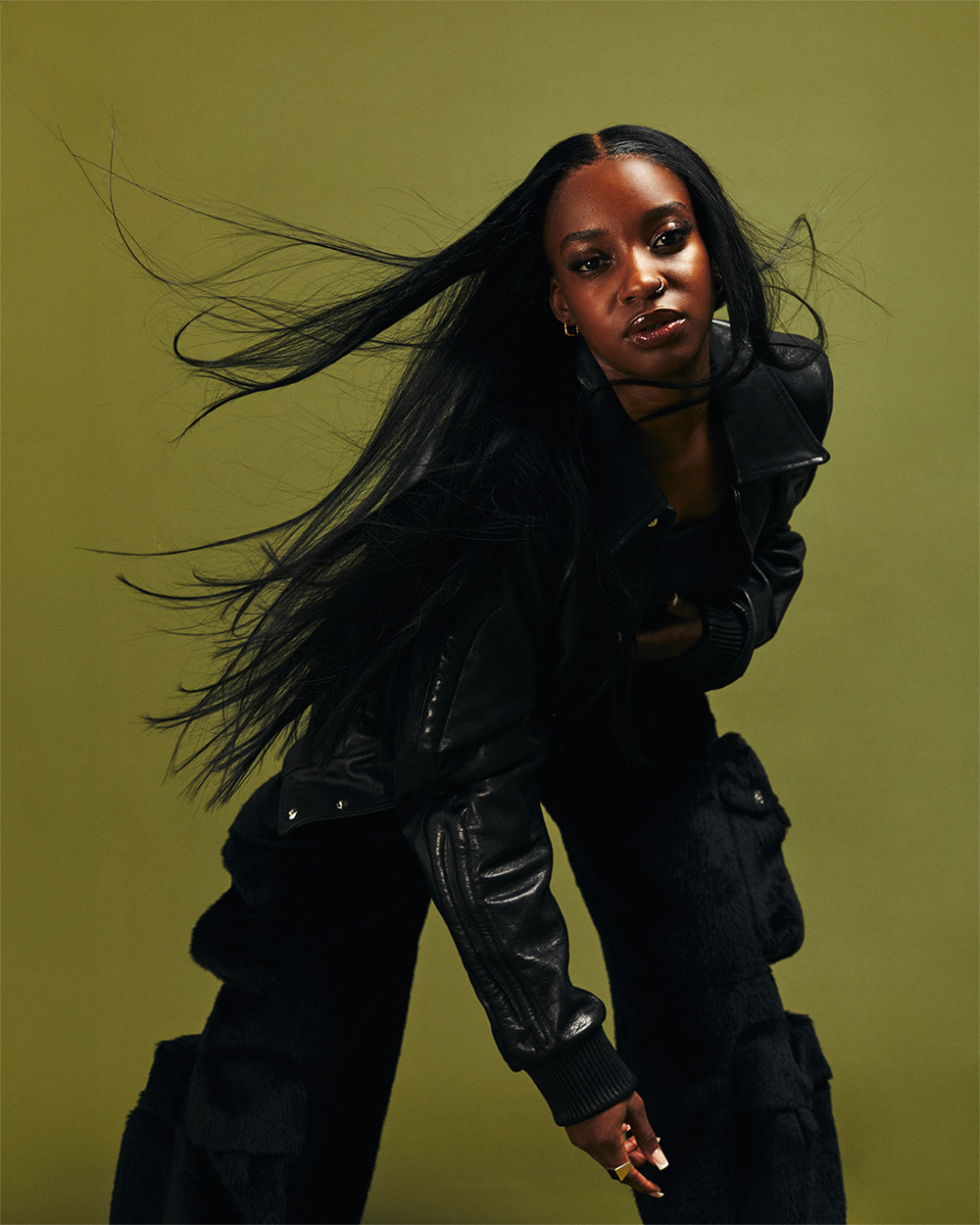
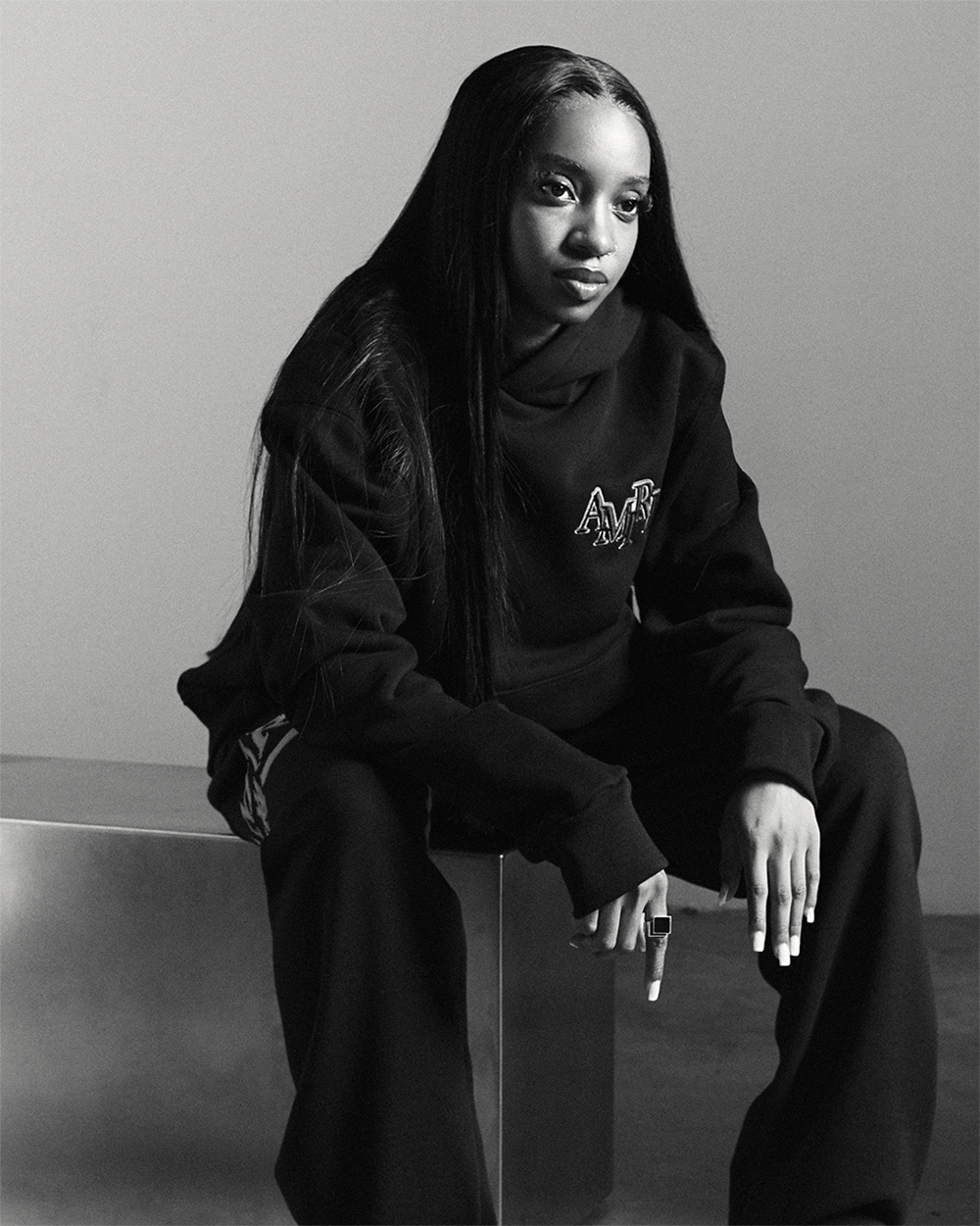
OJERIME
Music, to Ojerime, is second nature. The South London artist takes soul and R&B and imbues them with a UK twist, bending the genres to her will. She makes noise as a form of release, finding the meeting place between innovation and accessibility, nostalgia and modernity. She does it all from a place of uncompromising self-assurance – making music that speaks to her own existence, and makes her feel good as an artist.
How important is London to you and in what way does it inspire you?
It’s the catalyst to how I carry myself; the experiences that I go through. As I get older, I’ve been able to incorporate London into my work. It's interesting to see London be embraced through me and my music and not really having to change much – making music that can penetrate all ears across the world.
Was there a formative song or experience that put you on the path to where you are now?
I feel like I’ve always been pushed to do it. And I’ve always been embraced when I do it. There was always a euphoria for showing new music. I started to realise it was my gift. And every time I try to take a break from it it’s almost impossible – it’s like second nature. Those moments where I've made songs that have changed people’s lives or made people think or created an emotion or thought. It makes me realise I’m not doing a bad job.
Do you feel part of any particular lineage in your work?
I definitely think artists of my calibre help the future artists. I feel like artists who started when I did – I started in 2011 – are growing now but the generation afterwards is growing even faster. They have so much accessibility. They have so much access to music from years prior. You hear this mash-up, especially in the UK. You can hear how they’ve incorporated their influences. It’s interesting to see. So many genres are bending over time. There’s definitely a lineage. I have a lot of artists now who are being compared to me, whereas there was a time when I was being compared to other people.
Does seeing new artists make you feel excited?
Definitely now that I have artists that look up to me. There was a time when I would look up to artists, I still do. But now your audience can also become artists themselves, so it’s interesting to see how they incorporate different styles of music. Especially if they listen to me and see how they’re influenced by my take on R&B.
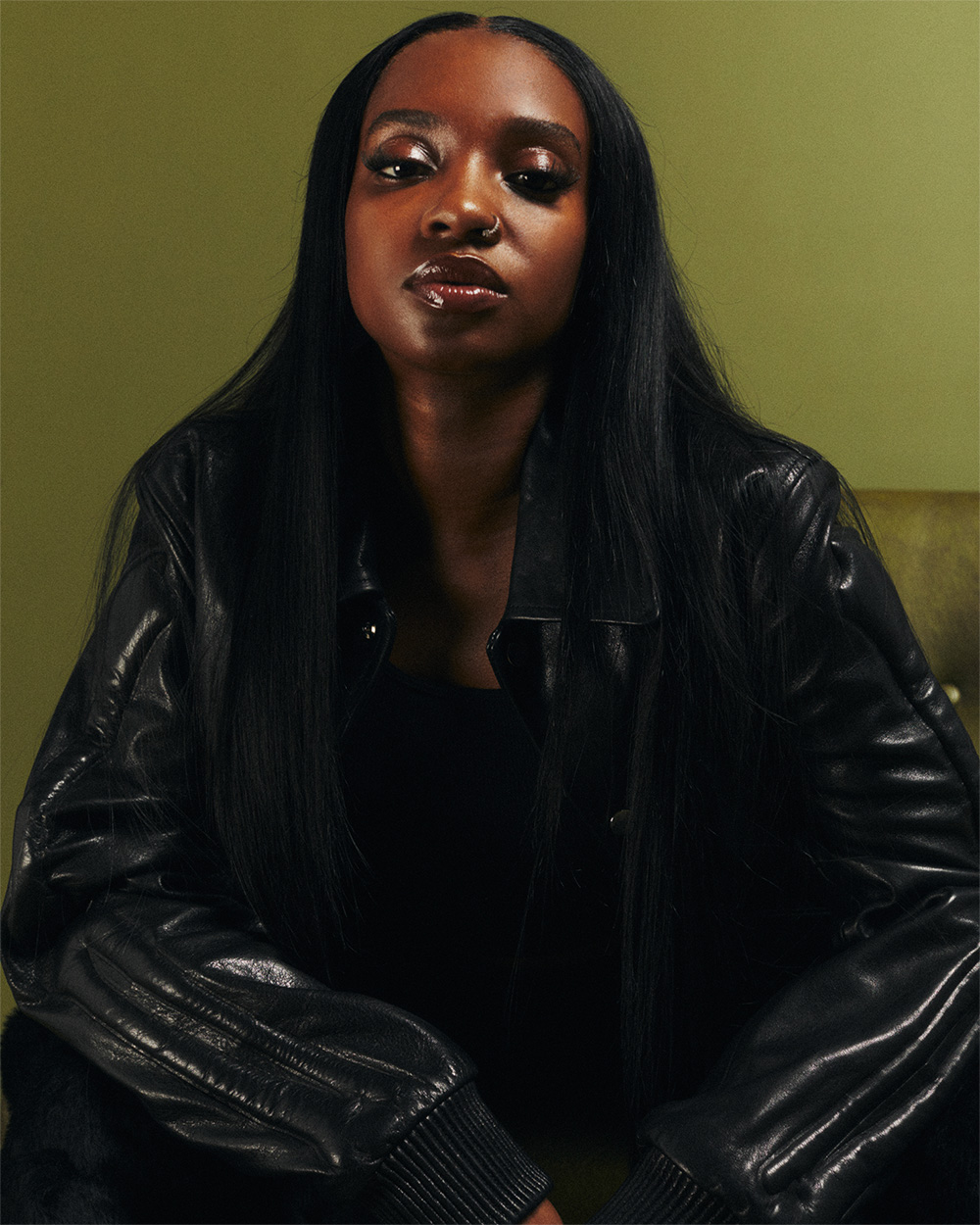
Are you quite discerning in what you like?
I’ve been told that I’m very particular. I like punchy music that sounds like a single. I don’t mean that in a label way or a commercial way. I just mean a song that really cuts through. Stands out. That’s the way I approach my projects. Super sharp. Not eye-catching but ear-catching music.
Does that discernment extend to style too?
Yeah, I’m very particular with my silhouette. Especially because I’m quite petite. I like to wear pieces that compliment. Since I was a kid, I’ve always been interested. I used to love wearing sneakers. I loved activewear but how we wear it now, in a fashionable way. I liked leisurewear as well. When I was growing up, I liked these flared jeans in a light blue with graffiti in a hot pink, from top to bottom. That’s my first memory of being fashion forward; just wanting to wear what I wanted at all times. I had to pick out my looks for school, youth club. I always had to look my best. And it wasn’t for anyone else – it was only for me.
How do you define style?
Clothes are a reflection of you. For me, I’m quite relaxed, I like to wear relaxed clothes – especially for what I do. I like streetwear, but I don’t jump on bandwagons and hype. I go for pieces I like. I’ve recently started buying designer pieces and incorporating them in. I love this new generation of fashion and how they incorporate streetwear and designer – the high-end pieces, just glimpsing out.
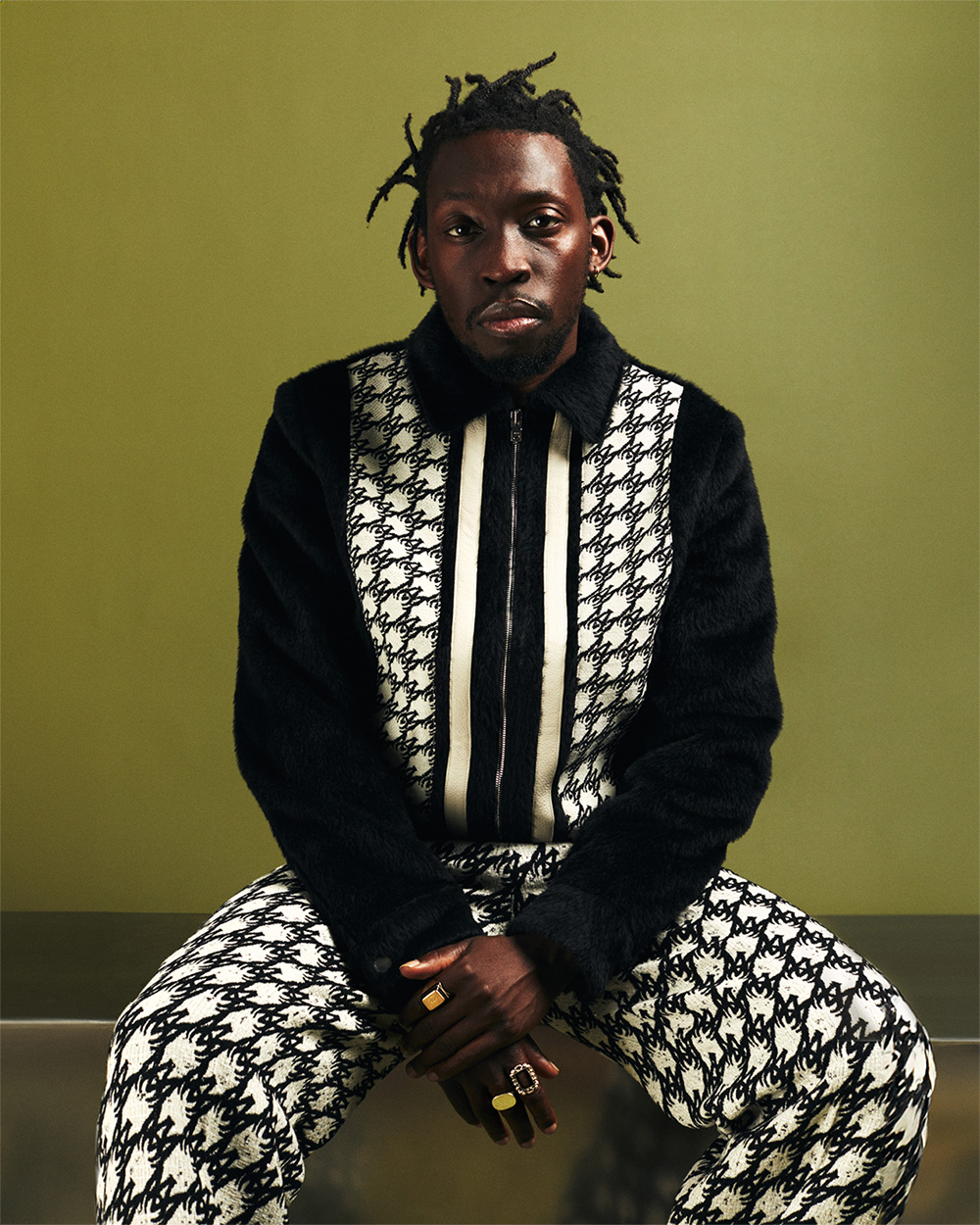
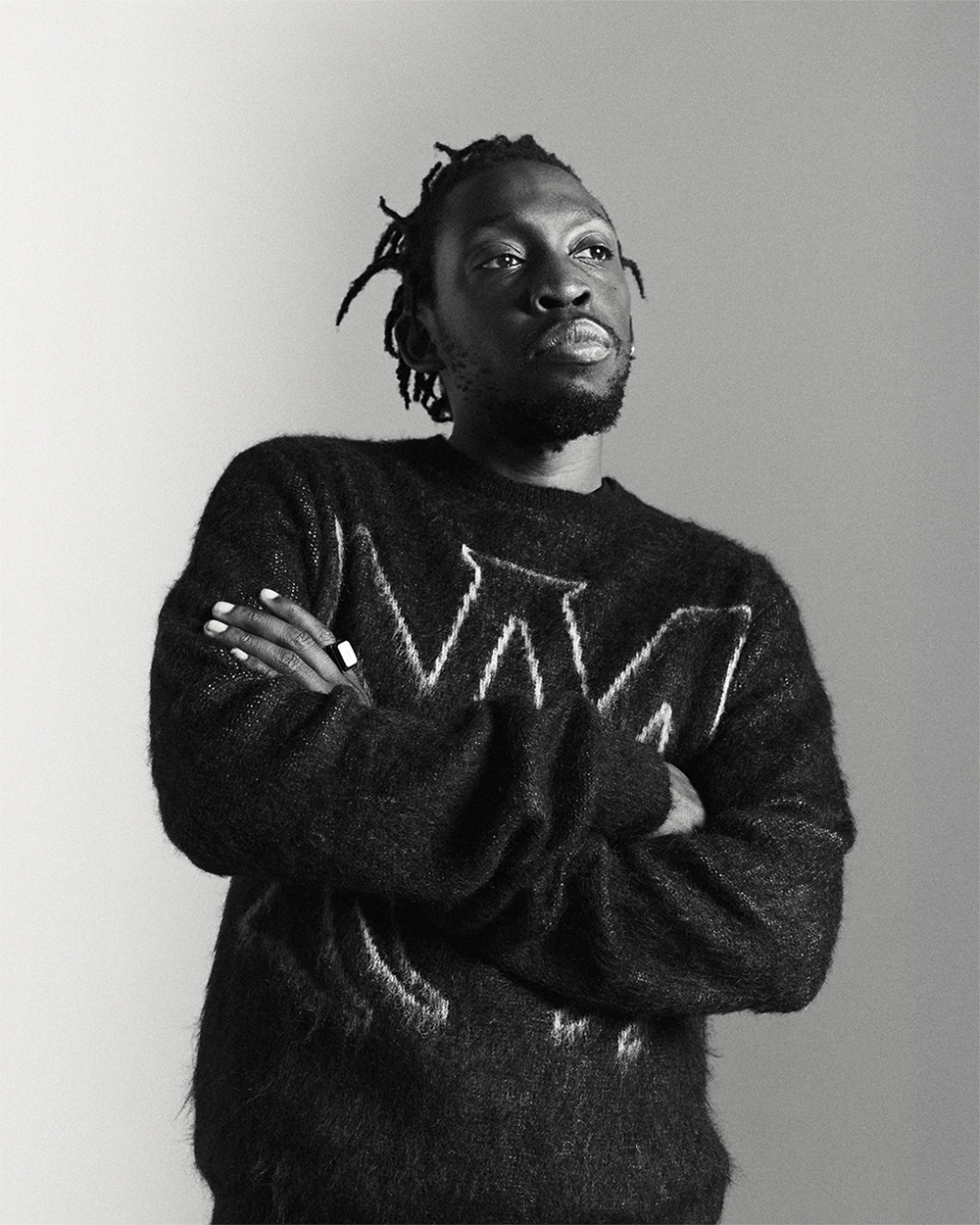
ERROL
Like Ojerime and Zakia, Errol is a product of his surroundings. Son to a Jamaican father and a Grenadian mother, music has been a part of his life since day one. His respect for community shines though in Touching Bass, the South London musical movement and platform he founded and sustains, today, with the help of like-minded friends.
How important is London to you and in what way does it inspire you?
London is the root of it all for me, I guess beyond the Caribbean where my parents are from. I've learned so much about London. I'm London born and raised. There's always stuff happening, keeping you on your toes. London has always been one of those places that has pushed the boat out creatively, and people aren't afraid to try new things and experiment.
Was there a formative song or experience that put you on the path to where you are now?
Multiple moments. But the one that forms the foundation for me as a music lover definitely goes back to family house parties – that I was probably too young to be at when there’s the smell of weed lingering in the air and reggae and dub blasting out the sound systems! But just that experience had such a profound effect on me. Because it was multigenerational and loving. You had elders sitting next to young’uns. Food was always involved. Music, community. It had such an effect on the way I approach things, even how I approach Touching Bass. It’s like an anchor for all of that.
Do you feel part of a lineage?
100%. We wouldn’t be doing things the way we’re doing them if it wasn’t for the people that came before us. So many influences have gone into making Touching Bass what it is. Not just from London; from Detroit, New York, techno, electro and house, the soundsystem continuum, the rhythm and the instrumentation of Africa. It all intertwines and comes out the other end as us.
How important is collaboration in your work?
It’s everything. No person is an island, as they say. I think the best way to get the best out of a project is to have multiple people that you trust coming together and making the best out of a situation or idea. Touching Bass would be nothing without the people that come and occupy the spaces and dance. It would be nothing without the DJs, the people behind the music and all of that stuff too. And beyond that, I feel like when you have a really strong team, it’s like Power Rangers. You bring out the best in each other and make beautiful moments – which is literally why we do this, you know?
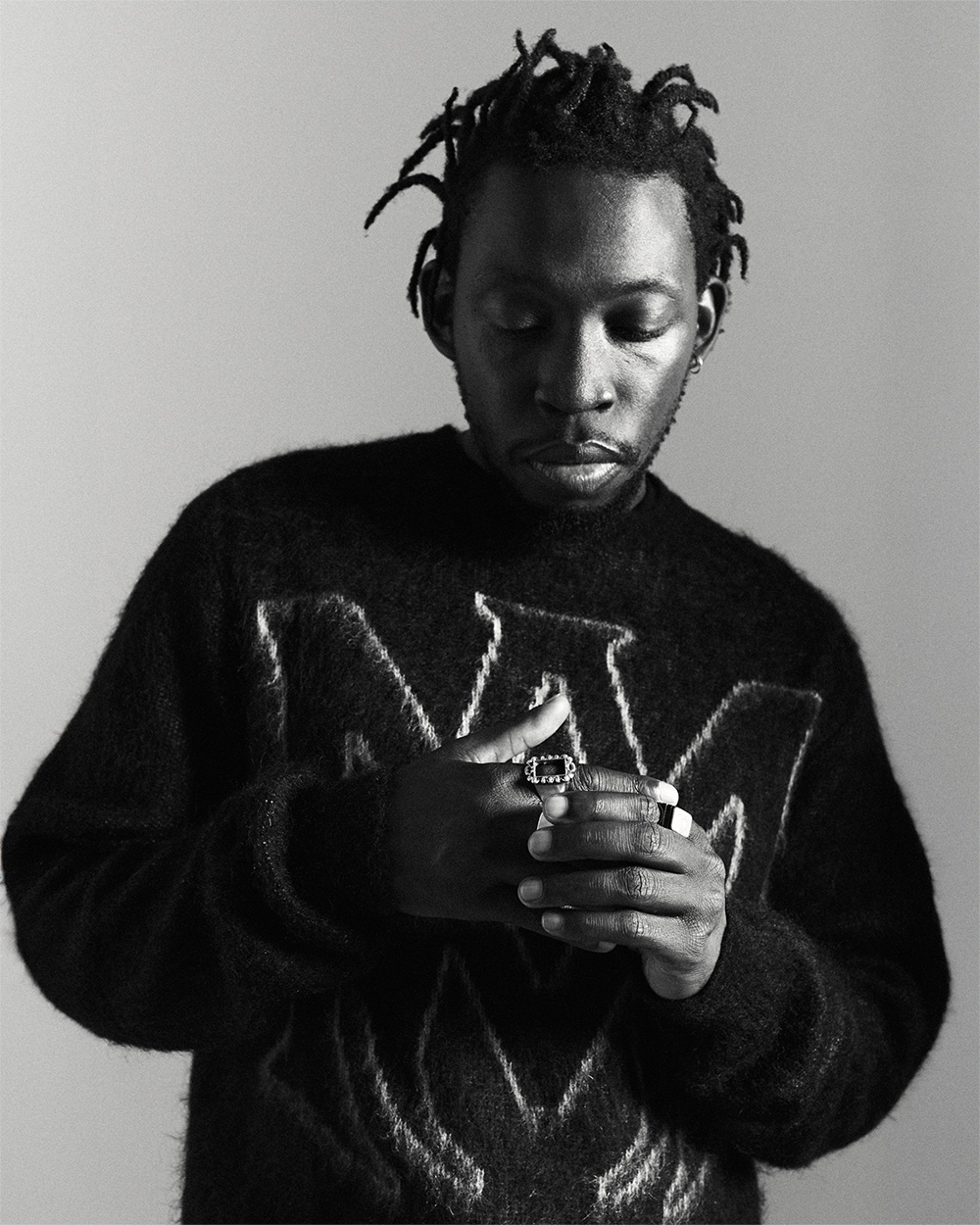
Does all of this extend to style too?
Yes! When I look at the contemporary designers that I really love, not only are their creations steeped in historical clarity, but there's a real sense that they're surrounded by good company.
Wales Bonner, Nicholas Daley, even my homie SAGE NATION. The reason they’re my favourites is because they have that timeless energy in their work, which is constantly intertwining across creative and cultural mediums. They don't just exist in a cultural vacuum.
How do you define style?
The people that I adore style-wise are brave, they’re not afraid to try new things. For me, style translates as ease, confidence and looseness. The closer I can get to pyjamas in terms of energy and feel, the better.
What makes you excited for the next generation?
The endless kind of treasure trove of information that they have to draw inspiration from. I just hope it instils a no fear attitude. But beyond that, I feel like when I speak to younger people, there's also a recognition of the importance of IRL things too. Truly important. So yeah, dive deep into the interwebs but just remember to take in some nature much bigger than yourself. Lay in some grass from time to time.
Do you feel optimistic about the future?
I feel like the world is always a treacherous place. And although I’m a realist, I do always remain optimistic about how young people can create stuff that’s exciting. I hope that young people take that fearlessness and make something good. Spread some joy because we need it.
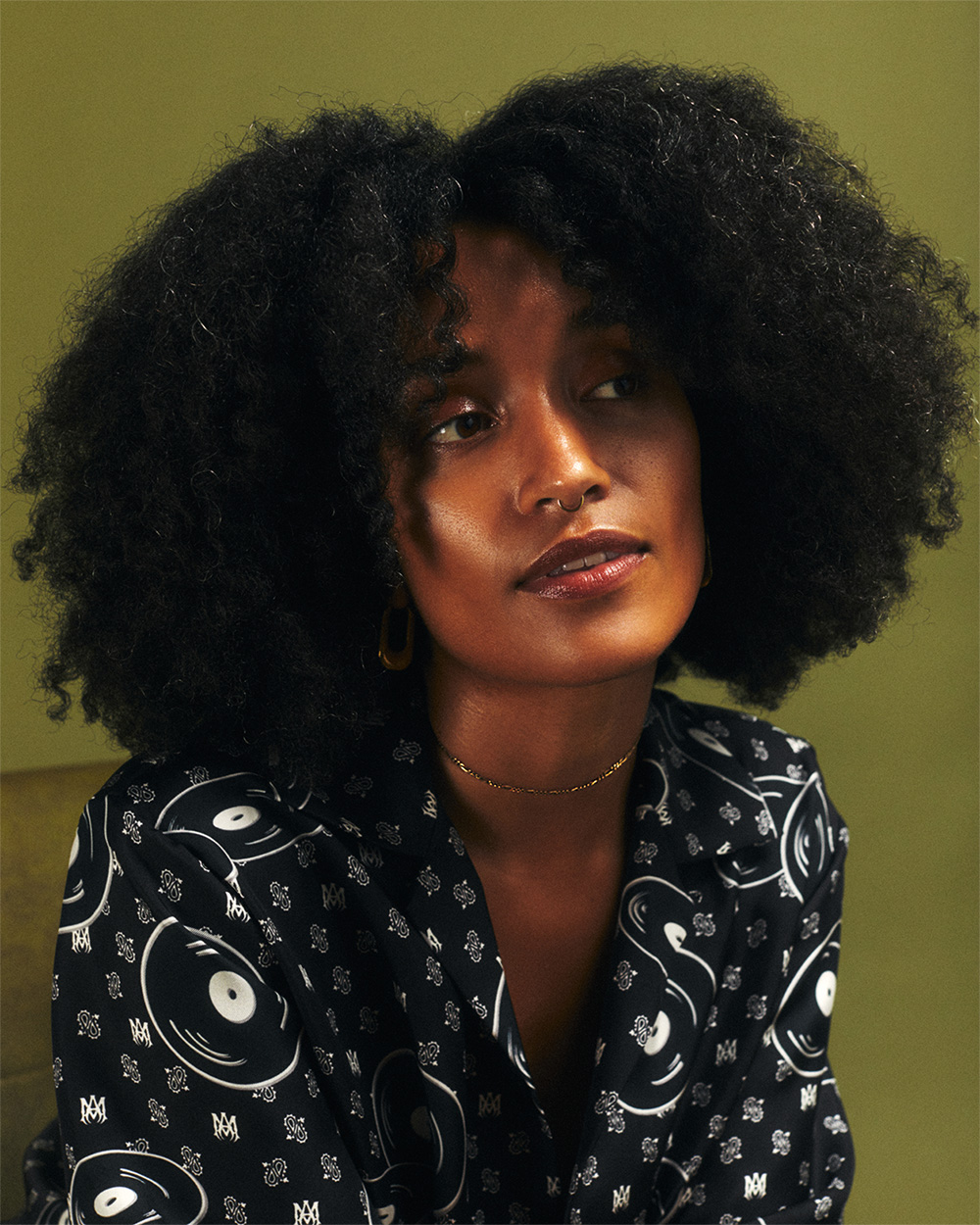
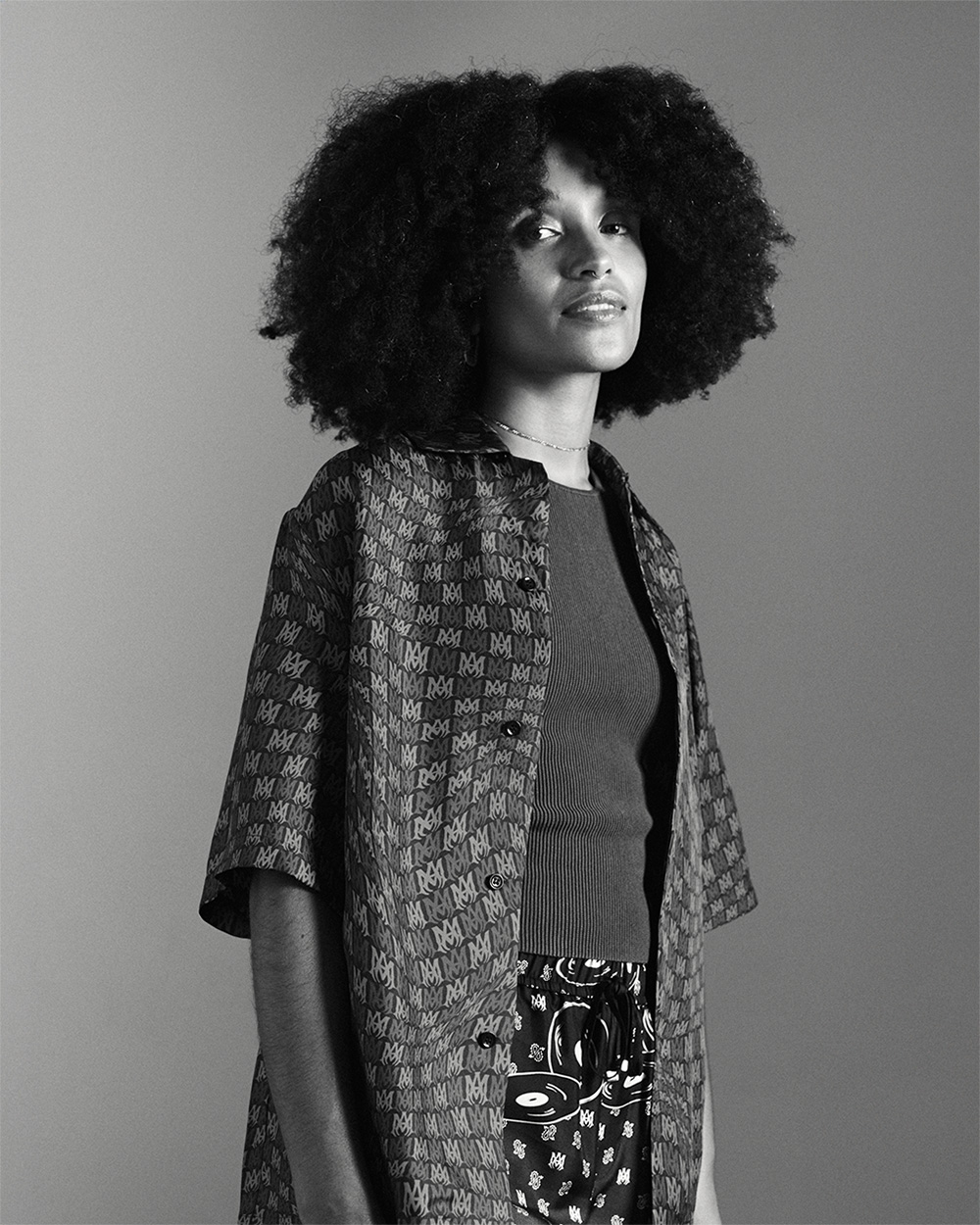
ZAKIA SEWELL
Through her work as a broadcaster and DJ, Zakia Sewell ties together the disparate threads, cultures and traditions of her native London. Renowned for her eclectic NTS breakfast show, which she hosts every Thursday and Friday morning, she is the product of a life spent around music, drawing together unusual combinations, and transmitting them forward to create something new entirely.
How important is London to you and in what way does it inspire you?
I’ve always lived in London. I was brought up in a place called Hounslow, which is next to Heathrow airport. It wasn’t a particularly vibrant, cultural place, but it was very diverse. I grew up with Polish shops and Afro-Caribbean stores and Indian restaurants. It was a very, very diverse area, which I think shaped the kind of cultural references I was exposed to. I have early memories of going to the Southbank or going to the Tate. All these free art spaces that were accessible to me as a kid. And all the kind of madness of London; being probably a bit scared but mesmerised by it as a child. It’s diverse, it’s loud, it’s in-your-face, and that breeds a certain character in the people, and the traditions and sounds that emerge here.
Was there a singular song or experience that put you on the path to where you are now?
I can’t say a singular experience, because both my parents were really into music. They were in an acid jazz band when I was growing up, so I was engulfed by music from an early age. My childhood was spent falling asleep on sofas at parties, or being at rehearsals, or even before I was born, my mum was gigging with me in her belly until she was 8 months pregnant. So all of that kind of conspired to move me on a path that was about music and culture and exploration.
Have you ever narrowed down your taste or have you always remained quite broad in what you’re interested in?
I think it’s always been broad. That’s reflected in the work that I do, whether I’m doing a radio show in the morning or I’m playing maybe more downtempo jazz, folk, soul music from Latin America and music from the African continent. Then my practice as a broadcaster, as a podcast producer and presenter where I’ve made documentaries about British folk culture and weird stuff like that. I’m about to start writing a book. So I think that kind of landscape that I described, growing up in London with that kind of mismatched, kaleidoscopic sort of culture all around – that’s very much reflected in my practice. I am trying to sort of narrow things down a bit, just for the sake of my sanity! But I think there’ll always be a breadth.
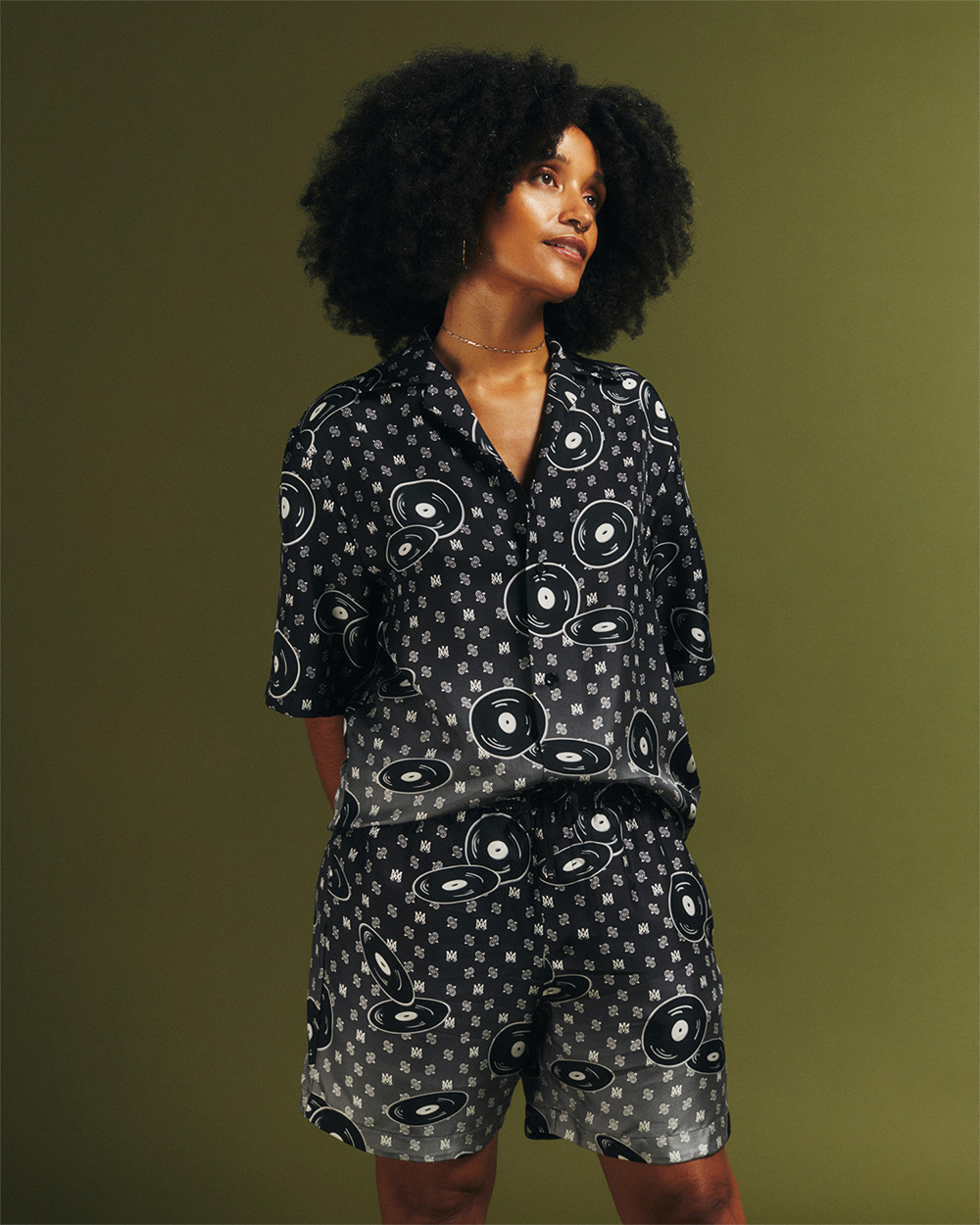
Do you feel part of any particular lineage in your work?
I feel part of a lineage of curious people, who have been fascinated by the world and wanted to understand it more. These days, I feel like lineages or tribes are less important. So many people’s tastes are incredibly eclectic. NTS is a good example of that. The number of shows that are specific genres are far less than the shows that are incredibly eclectic and play anything from gqom and kuduro music. So I feel like maybe that era of lineage and tribes and belonging to a group is less important now.
When was the last time you discovered something new that really excited you?
It’s not new culturally, but it’s new to me – sci-fi. I never really thought I’d be into sci-fi but I started reading Octavia Butler, who was an African American writer. It still feels very fresh and new because she was kind of writing about a kind of post-apocalyptic dystopia. And It gave me new ideas about change and how we create change and how change has to be something that’s embraced. That’s something that’s new.
Do you feel optimistic about the future?
I feel like we’re living in dark times. But I feel hopeful about the future because in dark times, some people are urged towards change. It’s always in dark times that new cultural formations emerge, new ways of thinking emerge – kind of out of desperation. That need to come up with new ways of seeing the world, being in the world and expressing ourselves. So I kind of feel like there's a hopefulness and a despair about the future. But ultimately hope prevails.
Photographer: Jonathan Middleton
Stylist: Sally Bottomley
Creative Producer: Dominique Taylor
Hair Stylist: Pål Berdahl @ LGA
Makeup Artist: Michelle Boggs @ LGA
Photography Assistant: Kermican Goren
Fashion Assistant: Rebekah Pavey
Hair Stylist Assistant: Nao Sato
Words: Matthew Whitehouse
RELATED READING
What Went Down: AMIRI x Browns House Party
The Shoot: Some Kind Of Wonderful
Mix It Up: Afterhours With Benji B